Fiat CM6614
The Fiat CM6614 is a 4x4 wheeled armoured personnel carrier developed as a joint venture between Fiat and Oto Melara of Italy. The hull is welded steel, and the vehicle is amphibious.[1] The first prototype was built in 1972.
| CM6614 | |
|---|---|
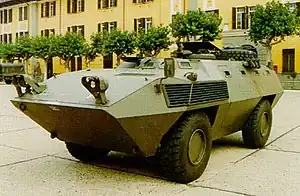 Fiat CM6614 | |
| Type | Wheeled armoured personnel carrier |
| Place of origin | Italy |
| Service history | |
| Used by | See: Operators |
| Wars | Somali Civil War Libyan Crisis |
| Production history | |
| Manufacturer | Fiat-Oto Melara Asia Motors (KM900 variants) |
| Variants | CM6616, KM900, KM901 |
| Specifications | |
| Mass | 8,500 kg (1,340 st) |
| Length | 5.86 m (19.2 ft) |
| Width | 2.5 m (8.2 ft) |
| Height | 1.78 m (5.8 ft) |
| Crew | 1-2 crew + 8-10 passengers (CM6614 & KM900) |
| Armour | Steel |
Main armament | CM6614 & KM900: 1 x MG 3 machine gun, K12 machine gun or 1 x .50 cal M2 machine gun CM6616: 1 x 7.62mm MG 3 machine gun or K12 machine gun 1 x 20mm Rheinmetall MK 20 Rh 202 autocannon |
| Engine | 1 x IVECO Model 8062.24 160hp @ 3,200rpm |
| Suspension | wheeled 4x4 |
Operational range | 700 km |
| Maximum speed | 100 km/h (62 mph) |
Description
The CM6614 hull is made of welded steel with uniform thickness of 8 mm; the driver's seat is on the front left of the vehicle and is equipped with five episcopes to the front and side of the driver which covers a field of vision of 200°. The engine with the transmission is located in on the front right side of the vehicle in order to have as much space as possible for the team of soldiers being transported. The crew compartment in the rear is equipped with a powered ramp for rapid disembarkation / embarkation of troops. There is also a hatch on both sides in the middle of the vehicle. Crew compartment has fume extractor, vision blocks and firing ports allowing troops to fire their personal weapons safely from the inside. The APC could be equipped with a simple manually operated turret armed with a 12.7 mm heavy machine gun and the turret could be folded down during airlift and strategic transportation. On each side of the turret there is an installation of three electrically operated fog/smoke grenade launchers.
The vehicle is amphibious and equipped with run-flat tires, in which the internal material is made of piano strings. Propulsion in the water is provided by the movement of wheels while buoyancy is achieved thanks to the shape of the vehicle. There's no trim vane however so the vehicle is not fully waterproof; the sensor detects the water level and automatically activates pumps to extract water from the vehicle.[2] The Fiat CM6614 can be very useful in rescue missions and emergencies such as natural disasters and for this reason it is still in service with the mobile police of the State Police.
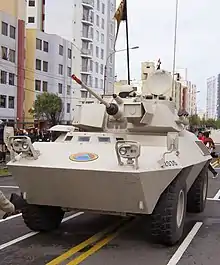
However, Italian-produced CM6614 in 1976 to 1977 showed major flaws in its armor steel during trials in South Korea. When a projectile impacts armor, the entire armor plate cracks like glass rather than creating a single hole. In addition, brand new vehicles also suffered cracks on the armor plate at high temperatures, cutting the vehicle into pieces without any human interference.[2]
Exports
South Korea
In the 1970s, South Korea came in need of wheeled armored vehicles to protect major cities and airfields against North Korean special forces by providing quick placement of defending troops. In 1976, South Korea received a sample of Thyssen Henschel UR-416 from West Germany and a CM6614 from Italy. Korea originally selected UR-416 for license production; however, due to political tension between South Korea and the United States, the U.S. blocked NATO members from selling such armored vehicles to South Korea. After hearing a refusal from West Germany, South Korea turned its eye to Italian company Fiat, which was very eager to sell the CM6614, and signed a contract behind the curtain for a license under the designation KM900.[2]
To avoid the restriction from NATO, Italy and South Korea smuggled CM6614 by shipping by parts to third countries, then rerouted to Busan for transferring to Asia Motors (now Kia) for assembly. During the trial, South Korea found major flaws in Italian armor steel, thus requested transfer of armor steel and run-flat tire technology in order to fix the problem and strengthen logistics by producing locally. The transferred technologies were sent to Korean steel & tire manufacturing companies and research groups, and became the basis for future Korean-made armor steel that is used in current MBTs, SPHs, IFVs, and even by the navy's destroyers.[2]
_067.JPG.webp)
KM900/KM901s were put in service since 1977, and were mainly used by the Republic of Korea Army Capital Defense Command, and airfield securities of the Republic of Korea Air Force.[2][3] The ROKAF began replacing KM900/KM901 with K200A1 APCs since 1997.[4] The ROKA also retired all vehicles from active service in 2016, and will replace the inventory with newly developed K806/K808 APCs.[5]
Variants
CM6616
The CM6616 was a version of the CM6614 that incorporated a turret armed with a 20mm autocannon. The turret was designed, built, and installed by OTO Melara.[6]
KM900/KM901
The KM900 was license produced version of the CM6614 by Asia Motors for use by the Republic of Korea Army and the Republic of Korea Air Force. The KM901 is a KM900 with a dozer blade on the front.[2]
Operators
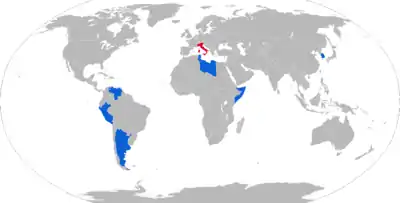
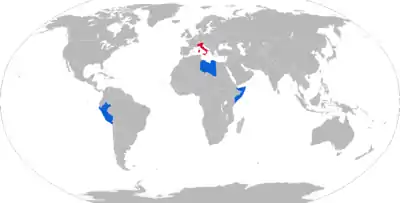
CM6616
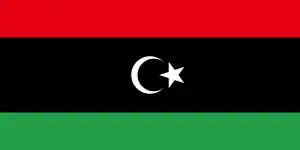 Libya - 100
Libya - 100 Peru
Peru
- Peruvian Army - 70
CM6614
 Italy
Italy
- Italian Air Force - 110
- Italian Army - 14
 South Korea - 400 [7]
South Korea - 400 [7]
 Somalia - 260
Somalia - 260
CM6616
 Italy (all out of service)
Italy (all out of service)
- Carabinieri - 52
 Somalia - 30
Somalia - 30
Note: Numbers reflect total orders/production for each country. Current holdings may be different.
References
- "Type 6614". Militaryfactory.com.
- [첨단국가의 초석, 방위산업] 한국형 장갑차의 꿈, KM900 경장갑차, retrieved 2022-06-20
- 국방일보. "국군 장갑차 보유 역사". 국방일보. Retrieved 2022-06-20.
- "공군의 지상 지원장비-(1)K200A1 장갑차". 아시아경제 (in Korean). 2020-03-17. Retrieved 2022-06-20.
- 문형철 (2016-06-07). "방위사업청, 국내기술로 차륜형 장갑차량 개발완료". 파이낸셜뉴스 (in Korean). Retrieved 2022-06-20.
- "FIAT - Oto Melara Type 6616 armoured car (Italy), Reconnaissance vehicles". Jane's Information Group. Archived from the original on 2012-08-20.
- "무기체계". Archived from the original on 2011-07-20. Retrieved 2010-09-14.